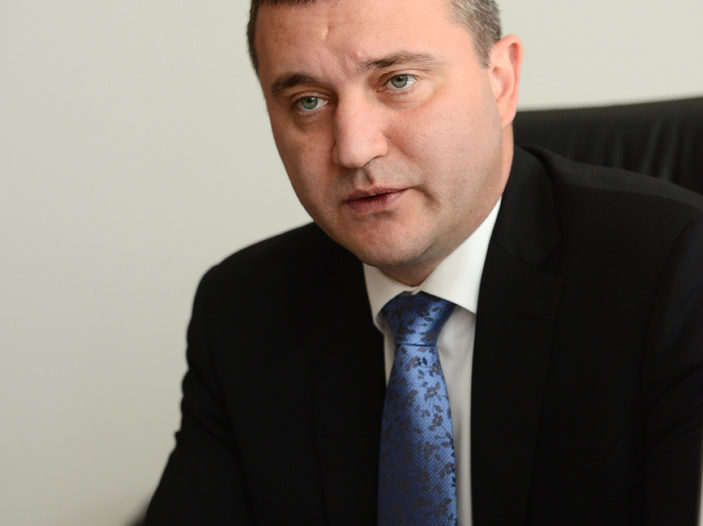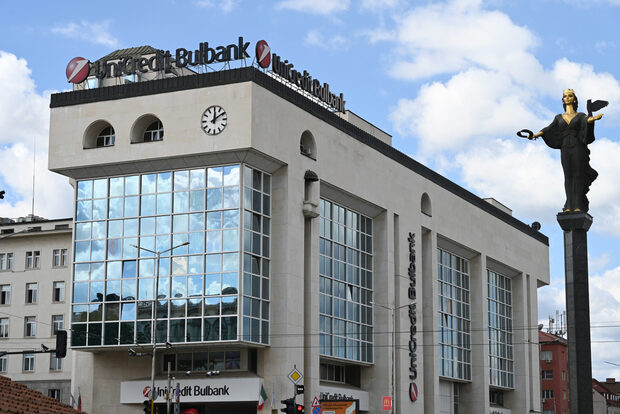Bulgaria's government plans to spend a record 44.5 billion levs, or 38.2% of GDP, next year when elections for local government and the European Parliament are held. The coalition cabinet of GERB and United Patriots can afford to be generous considering the booming economy and labor market, boosting revenue to the budget. However, efficiency is still lacking as a benchmark for spending in many sectors. This raises the question of whether lavish expenditure will actually improve public services. The few reforms that were attempted went no further than public debates and will likely stall. Revolutions are not on the agenda considering the upcoming elections in 2019, the rising expectations for a premature end to the third government of Prime Minister Boyko Borissov and increasingly vociferous scandals in the junior coalition partner United Patriots.
At the same time the window for structural change is quickly closing, possibly making 2019 the last year to permit such a lavish budget. In September IMF managing director Christine Lagarde warned of darkening clouds on the horizon for the global economy, and more and more analysts are pointing to 2020 as the year in which the next crisis will come knocking.
Financing income growth
The emphasis in the government's 2019 budget is on income growth for the second consecutive year. Close to one billion levs will be going to 433 thousand public sector workers whose wages and remuneration will be increased by around 10%, depending on a work assessment. The minimum wage is also on the rise - by 10% to 560 levs. Teachers will also be getting 330 million levs more thanks to a 20% growth in their wages promised by GERB in their 2017 election campaign.
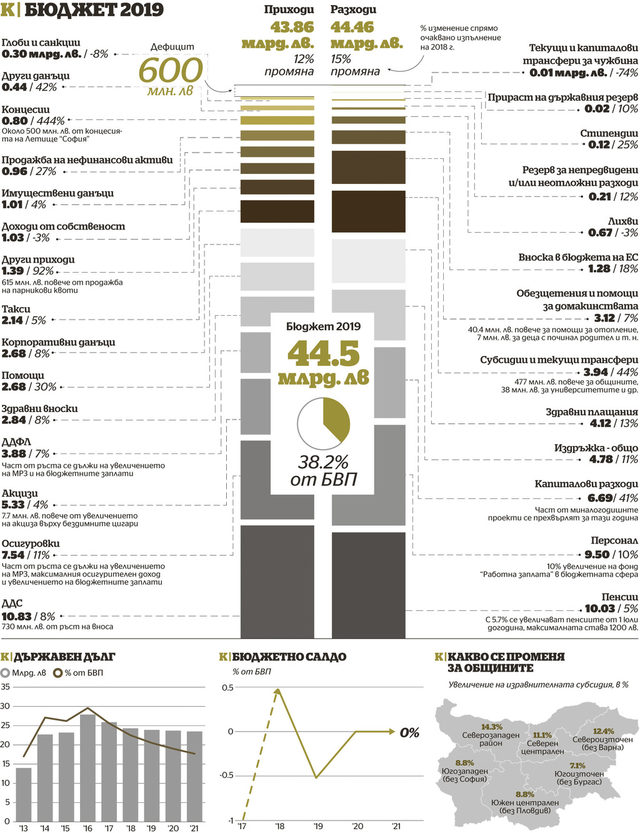
"Teachers' remuneration should have been raised because their salaries are too low. But this is only the first step. The increase must continue alongside measures to improve the quality of services teachers offered," said Kaloyan Staikov of Sofia-based think tank Institute for Market Economics. "For me, the explanation for this step right now is the election in 2019. The problem is that once you give police officers an increase in order to stop their protest it becomes very difficult to deny it to others in an election year," noted Georgi Angelov of the Open Society Institute-Sofia.
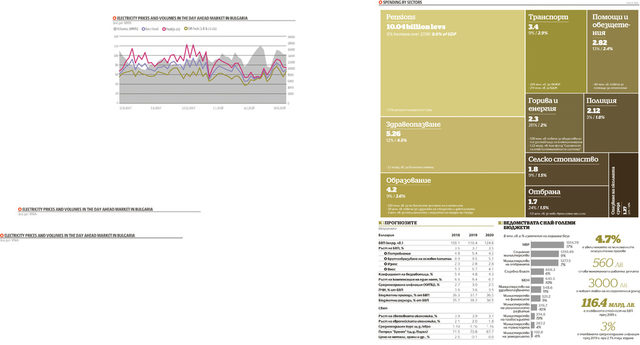
Higher public sector wages will likely lead to income growth in the economy as a whole, which may partly be the government's plan - to catch up with the European average faster. As a side effect, however, imports and consumption will also grow in a year in which the economy is likely to overheat. This means inflation will pick up. The Ministry of Finance is betting on price growth acceleration - in 2018 inflation is forecast at 2.7%, whereas in 2019 it is expected to reach 3.0%.
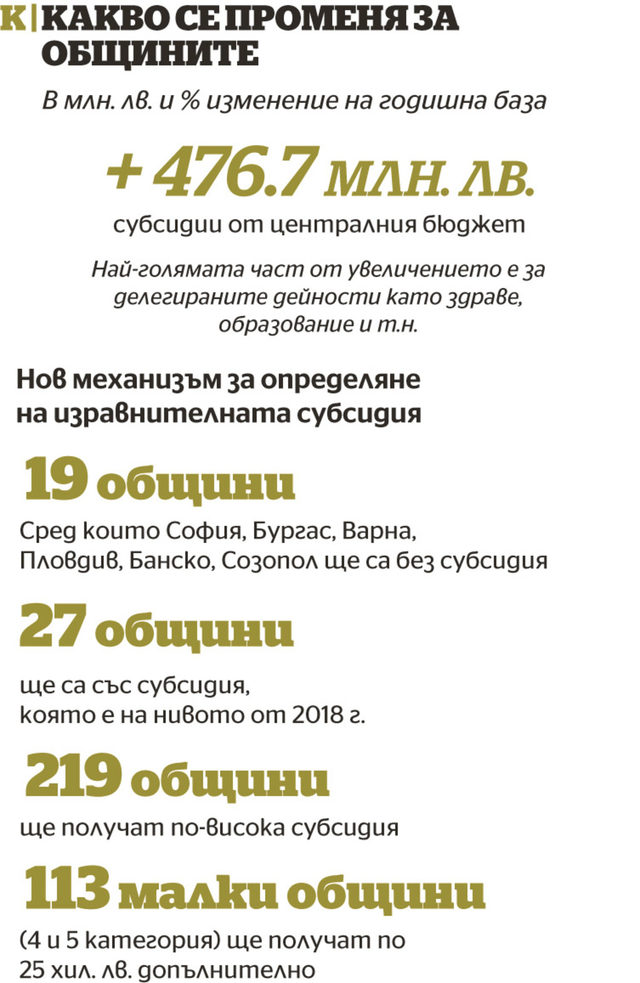
As a whole, expenditure is set to increase by 5.8 billion levs relative to the expected numbers this year. According to the Ministry of Finance, the boost is due to the rise in public sector wages and more money allocated to subsidies, health care and investment expenses.
Flirting with the voters
In an election year for local authorities, municipalities are also set to get more money from the central government budget. The resources slated for capital expenditures, snow-cleaning and other state activities will increase by 477 million levs. Next year, 131 small municipalities will receive an extra 25 million levs in capital subsidies. At this point, it is not clear whether the additional subsidy will be a one-off payment or not.
In addition, the finance ministry is proposing a revision to the subsidy formula, which evaluates how much each municipality receives from the central budget. The change will lead to a larger sum being delegated to districts with low fiscal capacities - those that collect too little revenue from local taxes. As a result, 19 municipalities - including Sofia, Plovdiv, Varna and other resorts and industrial centres - will not get a subsidy. On the other hand, Bulgaria's poorest and ever-lagging northwestern region will see a subsidy increase of 14.3%.
"The change in the available subsidy is not bad in itself. But if there is a problem with the economic sustainability of municipalities, then administrative reform should come first, and only after that should state interference follow," said Lyubomir Datsov, financial analyst and former Deputy Minister of Finance.
Tax burden growing
Outside the public sector, few will feel any benefit from the increase in government expenditure. In fact, the opposite will happen - part of the business community and employees will be paying more, mainly due to increased social security expenses. The insurance burden will grow for around 140 thousand people through the increase of the maximum insured monthly income by 400 levs to 3000 levs in 2019. The move will bring the budget an extra 150 million levs. At this point, it remains to be seen whether the hike will be approved by parliament.
An additional 115 million levs in budget revenues will come from increasing the minimum wage and insurance thresholds.
Flimsy deficit
For the tenth year running, government finances are set for the deficit in 2019, with the gap planned at 600 million levs, equivalent to 0.5% of GDP. Similarly to last year, the biggest hike in costs is in investment because projects planned for 2018 have not commenced and have been shifted to next year. However, most likely 2019 will be the fourth consecutive year in which the deficit will turn into surplus by December, given that capital expenditures are traditionally not implemented to their full extent.
According to Angelov, the 2019 budget has several buffers. One of them is interest payments; investment costs are another. For example, by the end of September 2018, capital expenditures implemented are a third of the sum planned in this year's budget. At best, they will reach a little over three-quarters of the level targeted, judging by the ministry's anticipated performance.
However, the part of the budget which is most difficult to cut - wages, subsidies and social payments - will grow fast next year, limiting the options for response in the case of a crisis, especially if inflation turns to deflation along with oil prices.
"From a macroeconomic point of view there are risks, but if you know what you're doing, the budget can easily be handled," said Datsov. The problem lies more in the efficiency of expenditure. And considering the government's refusal to implement meaningful reforms, miracles are not to be expected.
Bulgaria's government plans to spend a record 44.5 billion levs, or 38.2% of GDP, next year when elections for local government and the European Parliament are held. The coalition cabinet of GERB and United Patriots can afford to be generous considering the booming economy and labor market, boosting revenue to the budget. However, efficiency is still lacking as a benchmark for spending in many sectors. This raises the question of whether lavish expenditure will actually improve public services. The few reforms that were attempted went no further than public debates and will likely stall. Revolutions are not on the agenda considering the upcoming elections in 2019, the rising expectations for a premature end to the third government of Prime Minister Boyko Borissov and increasingly vociferous scandals in the junior coalition partner United Patriots.
At the same time the window for structural change is quickly closing, possibly making 2019 the last year to permit such a lavish budget. In September IMF managing director Christine Lagarde warned of darkening clouds on the horizon for the global economy, and more and more analysts are pointing to 2020 as the year in which the next crisis will come knocking.








